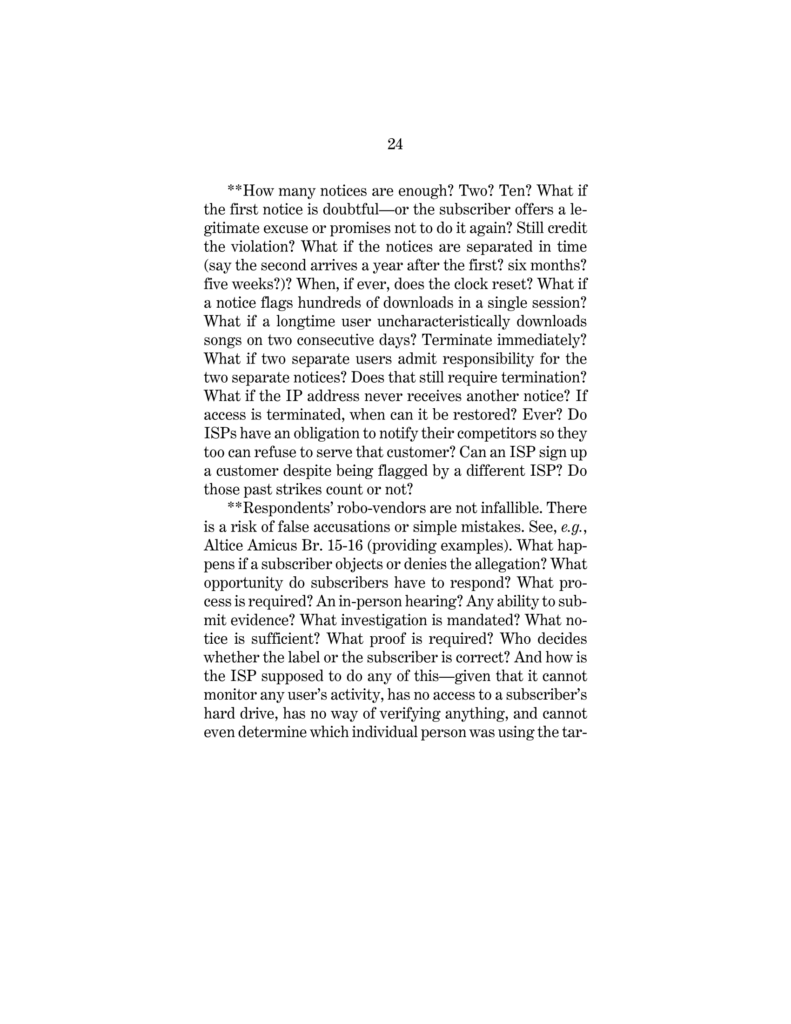Following a lawsuit from several major record companies, including UMG Recordings, Sony Music Entertainment, and Warner Bros. Records, major Texan ISP Grande Communications Networks has sought the Supreme Court’s intervention after being found guilty of contributory copyright infringement by failing to terminate Internet access after receiving evidence that its customers were committing copyright infringement. The judgment was handed down in 2023; Grande’s efforts at appeal failed in 2024.
In October 2010, after previous compliance, Grande adopted a policy to never terminate any subscribers for copyright infringement, no matter how many reports it received. This fact was highlighted in its 2023 court loss, in which a jury found that Grande had credible proof of customers committing copyright infringement and willfully failed to “take basic measures to prevent further damages to copyrighted works.” A basic measure, the court argued, included terminating Internet subscriptions.
The record companies pay companies like Rightscorp to track BitTorrent users and identify pirating customers’ IP addresses, which are then forwarded to Grande. They argue that after sending one notice of a pirating customer, if Grande takes no action after a second notice, this would constitute contributory copyright infringement. Grande says terminating “connections prematurely in response to two unsubstantiated allegations of infringement” was a “staggering penalty for a $2 harm.“
The court sided with the record companies, ordering Grande to pay $46,766,200 in statutory damages for failing to terminate connections. This was later ordered to be recalculated upon appeal. Nevertheless, the ruling added to precedents that courts may use in the future to hold ISPs responsible for the actions of their users — despite the legal avenues to directly target infringers for their actions.
“Copyright holders have a clear right to sue those directly responsible for infringing conduct (and the right to force ISPs to reveal the identities of those parties). Respondents may not wish to do that for political or public-relation reasons. But that is their choice—and it is on them for refusing to invoke the rights Congress actually provided via statute,” Grande said.
Grande says forcing ISPs to ban customers or face massive legal damages would be “unworkable and deeply concerning,” “deeply unfair,” would “unduly harm innocent subscribers,” and highlights the heavy cost of terminating connections, including harming children’s learning, disabling connected medical devices, among others.
ALSO READ:
Pokémon Leaker Targeted in Nintendo U.S. Subpoena Request to Discord
Grande also laid out numerous logistical issues with placing the onus on ISPs to ban customers without Congress creating a detailed framework on how to do this, which would likely follow years of consultations. It’s worth noting that Sony, Warner, and Universal (through Atlantic), all parties to this case, are members of the MPA, which consulted with lawmakers on the recent FADPA foreign anti-piracy bill tabled by Congresswoman Zoe Lofgren. ISPs were also consulted.
Below is an excerpt of what Grande believes are the logistical challenges if they were to be found guilty of contributory copyright infringement:
“How many notices are enough? Two? Ten? What if the first notice is doubtful—or the subscriber offers a legitimate excuse or promises not to do it again? Still credit the violation? What if the notices are separated in time (say the second arrives a year after the first? six months? five weeks?)? When, if ever, does the clock reset? What if a notice flags hundreds of downloads in a single session? What if a longtime user uncharacteristically downloads songs on two consecutive days? Terminate immediately?
What if two separate users admit responsibility for the two separate notices? Does that still require termination? What if the IP address never receives another notice? If access is terminated, when can it be restored? Ever? Do ISPs have an obligation to notify their competitors so they too can refuse to serve that customer? Can an ISP sign up a customer despite being flagged by a different ISP? Do those past strikes count or not?“
Enjoy several pages of logistical challenges:
Grande and the District Court for the Western District of Texas particularly disagreed on the interpretation of MGM Studios, Inc. v. Grokster, Ltd, a case that the Supreme Court weighed in on in 2005; the District Court cites Grokster in that Grande “materially contributes” to the act of piracy through continuing to provide Internet access. Meanwhile, Grande cites Grokster in that “in the absence of other evidence of intent, a court would be unable to find contributory infringement liability merely based on a failure to take affirmative steps to prevent infringement, if the device otherwise was capable of substantial noninfringing uses.“
Source: Law360
Featured image ©Koyoharu Gotoge / SHUEISHA, Aniplex, ufotable
ALSO READ:
Popular Game Developer Square Enix Files Lawsuit Over Front Mission Copyright Infringement
The list of record companies includes:
UMG Recordings, Inc.; Capitol Records, LLC; Warner Bros. Records Inc.; Sony Music Entertainment; Arista Records, LLC; Arista Music; Atlantic Recording Corporation; Capitol Christian Music Group, Inc.; Elektra Entertainment Group, Inc.; Fonovisa, Inc.; Fueled by Ramen, LLC; LaFace Records, LLC; Nonesuch Records, Inc.; Rhino Entertainment Company; Roadrunner Records, Inc.; Roc-A-Fella Records, LLC; Tooth & Nail, LLC; and Zomba Recording, LLC







Participate In Discussions